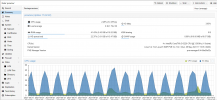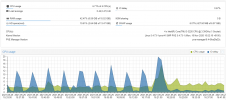Hi, I have some issues with high IO delay. I have a mSATA 60Gb drive to store the base system
I tried with two 2,5" barracuda compute 1Tb hard disk in mirror with ZFS (for VM, CT, backups, templates and isos) the last week and now (the pic) is only one barracuda compute to store VM and CT, isos and templates (in ext4 format) and a second hard disc 250Gb to store backups (ext4 too).
Why I have this high IO delays?
I tried iotop and no more than 500 K/s of write data, usual 35-50 K/s
This is a write speed of the 1Tb hard disk (where VM and CT are stored)
And a read speed of the 1Tb hard disk
I have the system up to date 6.4.6 pve-manager/6.4-6/be2fa32c (running kernel: 5.4.114-1-pve)

I tried with two 2,5" barracuda compute 1Tb hard disk in mirror with ZFS (for VM, CT, backups, templates and isos) the last week and now (the pic) is only one barracuda compute to store VM and CT, isos and templates (in ext4 format) and a second hard disc 250Gb to store backups (ext4 too).
Why I have this high IO delays?
I tried iotop and no more than 500 K/s of write data, usual 35-50 K/s
This is a write speed of the 1Tb hard disk (where VM and CT are stored)
Code:
root@proxmox:/dev/Disco1Tb# dd count=1000 bs=1M if=/dev/urandom of=/dev/Disco1Tb/random.out
1000+0 records in
1000+0 records out
1048576000 bytes (1.0 GB, 1000 MiB) copied, 3.42414 s, 306 MB/sAnd a read speed of the 1Tb hard disk
Code:
root@proxmox:/dev/Disco1Tb# hdparm -t /dev/sda
/dev/sda:
Timing buffered disk reads: 218 MB in 3.24 seconds = 67.19 MB/secI have the system up to date 6.4.6 pve-manager/6.4-6/be2fa32c (running kernel: 5.4.114-1-pve)
Code:
proxmox-ve: 6.4-1 (running kernel: 5.4.114-1-pve)
pve-manager: 6.4-6 (running version: 6.4-6/be2fa32c)
pve-kernel-5.4: 6.4-2
pve-kernel-helper: 6.4-2
pve-kernel-5.4.114-1-pve: 5.4.114-1
pve-kernel-5.4.73-1-pve: 5.4.73-1
ceph-fuse: 12.2.11+dfsg1-2.1+b1
corosync: 3.1.2-pve1
criu: 3.11-3
glusterfs-client: 5.5-3
ifupdown: 0.8.35+pve1
ksm-control-daemon: 1.3-1
libjs-extjs: 6.0.1-10
libknet1: 1.20-pve1
libproxmox-acme-perl: 1.1.0
libproxmox-backup-qemu0: 1.0.3-1
libpve-access-control: 6.4-1
libpve-apiclient-perl: 3.1-3
libpve-common-perl: 6.4-3
libpve-guest-common-perl: 3.1-5
libpve-http-server-perl: 3.2-2
libpve-storage-perl: 6.4-1
libqb0: 1.0.5-1
libspice-server1: 0.14.2-4~pve6+1
lvm2: 2.03.02-pve4
lxc-pve: 4.0.6-2
lxcfs: 4.0.6-pve1
novnc-pve: 1.1.0-1
proxmox-backup-client: 1.1.6-2
proxmox-mini-journalreader: 1.1-1
proxmox-widget-toolkit: 2.5-5
pve-cluster: 6.4-1
pve-container: 3.3-5
pve-docs: 6.4-2
pve-edk2-firmware: 2.20200531-1
pve-firewall: 4.1-3
pve-firmware: 3.2-3
pve-ha-manager: 3.1-1
pve-i18n: 2.3-1
pve-qemu-kvm: 5.2.0-6
pve-xtermjs: 4.7.0-3
qemu-server: 6.4-2
smartmontools: 7.2-pve2
spiceterm: 3.1-1
vncterm: 1.6-2
zfsutils-linux: 2.0.4-pve1
Last edited:


